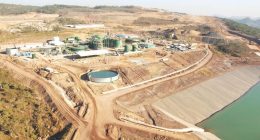The Central Bank of Nigeria (CBN) has revealed a sharp rise in the value of its gold reserves, which surged to N2.77 trillion by December 31, 2024—more than doubling from N1.28 trillion recorded at the end of the previous year.
This increase, disclosed in the apex bank’s audited financial statements for the 2024 financial year, was driven entirely by a surge in global gold prices, as the volume of gold held remained unchanged at 687,402 troy ounces.
The CBN valued its bullion at $2,624.39 per ounce at year-end, significantly higher than the $2,062.98 per ounce valuation in 2023. The gains reflect a broader international trend as central banks worldwide increased gold purchases amid heightened concerns over inflation, economic instability, and volatile currencies.
According to the World Gold Council’s 2024 Gold Demand Trends report, global demand for the precious metal, including over-the-counter investments, rose by 1% to 4,974 tonnes—setting a new annual record. Central banks remained key players, buying over 1,000 tonnes for the third straight year.
The report also noted that the average gold price in 2024, based on the London Bullion Market Association (LBMA), climbed by 23% year-on-year to $2,386 per ounce. In the fourth quarter alone, prices averaged $2,663 per ounce, further boosting the value of official holdings across the globe.

Total global demand for gold hit a record $382 billion during the year, reflecting the dual impact of surging prices and sustained interest from institutional and retail buyers alike.
Nigeria’s embrace of gold appears to be part of a broader strategy to diversify its external reserves away from traditional currencies. Gold now accounts for approximately 5.1% of the nation’s total external reserves—up from 4.3% in 2023—highlighting a deliberate move to hedge against risks tied to the US dollar and global financial instability.
The CBN’s accounts also showed a significant boost in Nigeria’s total external reserves, which climbed to N54.73 trillion by the end of 2024, up from N29.98 trillion a year earlier. The net foreign exchange reserves reached $23.11 billion—the highest level in over three years—marking a sharp rebound from $3.99 billion in 2023, $8.19 billion in 2022, and $14.59 billion in 2021.
Gross external reserves also improved, rising to $40.19 billion from $33.22 billion the year before.
This recovery has been attributed to several key factors. The CBN’s decision to cut back on short-term foreign exchange commitments, such as swaps and forward contracts, helped ease pressure on the net reserve position. Additionally, improved foreign exchange inflows from non-oil sectors have bolstered the reserves, reducing Nigeria’s dependence on oil revenue.
Looking ahead, projections suggest central banks will continue expanding their gold holdings in 2025. Nigeria’s growing gold position appears to reflect this global trend of securing tangible, inflation-resistant reserve assets.













